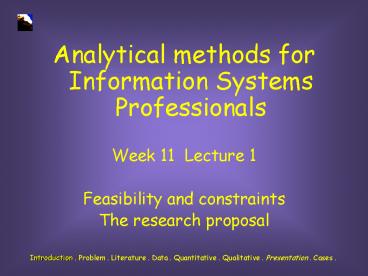Analytical methods for Information Systems Professionals - PowerPoint PPT Presentation
1 / 22
Title:
Analytical methods for Information Systems Professionals
Description:
Analytical methods for Information Systems Professionals. Week 11 Lecture 1 ... Syracuse, New York: Syracuse University Press. Introduction . Problem . Literature. ... – PowerPoint PPT presentation
Number of Views:27
Avg rating:3.0/5.0
Title: Analytical methods for Information Systems Professionals
1
- Analytical methods for Information Systems
Professionals - Week 11 Lecture 1
- Feasibility and constraints
- The research proposal
2
- Todays topics
- Planning the research project
- and
- Writing the proposal
3
- Important preliminary questions
1. What is a proposal? 2. What is the purpose of
a proposal? 3. Why have I chosen my particular
topic? 4. Is my topic feasible and focused?
5. Do I need any kind of ethical permission?
6. What facilities will I need? 7. What kind of
help from other people will I need? 8. What sort
of research and methodology is most appropriate
for my topic?
4
- The Research Proposal
- Definition
- A document that presents a case for an idea and
the action one proposes with respect to it - Krathwohl, D.R. (1988) (3rd ed.) How to prepare
a research proposal. Guidelines for funding and
dissertations in the social and behavioural
sciences. Syracuse, New York Syracuse
University Press.
5
- The Research Proposal
- Purpose
- To justify what you plan to do, in order to gain
approval for it - Tornquist, E.M. (1986) From proposal to
publication. An informal guide to writing about
nursing research. Menlo Park, California
Addison-Wesley.
6
- The research proposal
- Lays the groundwork for the work youre planning
to do - Forces you to think through the whole project
from beginning to end. - This means you can anticipate problems tht may
occur during the course of your study and to be
prepared for them - If you have an idea of where you are going, its
easier to get there.
7
- Structure of a research proposal
- Title
- Introduction to the project/study
- Objectives
- Background to the problem/question the
literature review - Conceptual framework
- Research methodology data collection and analysis
- Time schedule and budget
- Chapter outline of report
- Bibliography
8
- Title and Introduction
- The topic
- Exploratory (self-generated) OR
- Given (responsive)
- Must be feasible and within your competence
- Moves from the general to the specific
- May change over time
- limitations
- See handout for topic guide
9
- Title and Introduction
- The introduction
- Provides a map for the reader of what lies ahead
- Makes the reader want to know more
- Tells
- What the study is about
- Why it is important
- Gives context by referring to other work in the
area - States what is needed to be done
- States the problem/question
10
- Objectives
- Defining the purpose
- To explain
- To describe
- To explore
- To support a position
- Present the main objective of the project
- Present specific objectives
- Why is this worth doing
- What will it achieve
11
- Background to the problem/question the
literature review - What have others said about the topic?
- What theories address it and what do they say?
- What previous research/body of work exists?
- Are there consistent findings or do past studies
disagree? - Are there gaps in the existing work that you can
fill
12
- Background to the problem/question the
literature review - Contributes to your overall justification of your
research - Must be more than a summary of what you read in
the area - Tells your reader where your work fits in with
others work
13
- Identifies relevant issues or controversies
- Organises and categorises relevant works
- Critiques their value
- Analyses and synthesises what you have read
- Identifies the theoretical background to your
research
14
- The conceptual framework
- Conceptualisation
- The conceptual framework indicates how the
researcher views the concepts involved in a study
especially the relationships among concepts
15
Development of the conceptual framework
Identify concepts
Operationalise concepts
Define concepts
Explore relationships among concepts
16
- Elements of
- Research
- Conceptual Framework
- (Epistemological theoretical perspective)
- Methodology
- Methods
Objectivist meaning and reality exist apart
from anybody being conscious of them
Constructivist meaning derives from our
interaction with the world Subjectivist meaning
is imposed on an object by the subject
The philosphical stance that underlies our chosen
methodology our assumptions What do we
recognise as knowledge How do we know what we
know? What is true
- Positivist
- Interpretive
Plan of action, research design and why
- Techniques
- Surveys
- Interviews
- observation
17
- Research methodology data collection and
analysis - Where does your study fit along the
empirical/non-empirical range? - What is your theoretical or conceptual framework?
- What is your overall research methodology?
- Are there any ethical considerations
18
- What information do you need to collect?
- Primary vs secondary data
- Where will you get it?
- How will you collect it?
- How will you analyse it?
- What resources and skills do you need for the
analysis?
19
- Time schedule and budget
- Plan your project as you would any other project
- Identify all tasks
- Provide a timeline allocating all tasks in it
- Identify contingencies
20
- identify milestones
- Identify points of risk
- identify the resources you need (money, people,
time, equipment, supplies, telephone, postage
etc.) - Identify where you will get those resources from
21
- Write a chapter outline of report before you
begin your research.
22
- Bibliography































